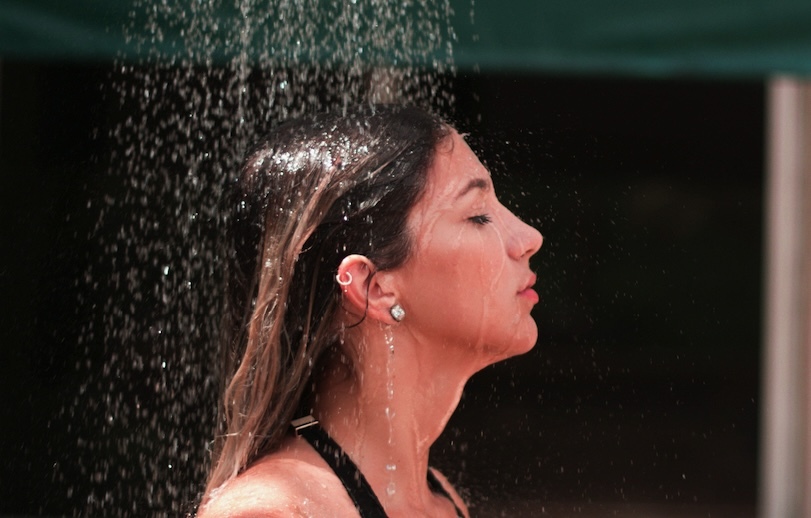Best shower filter for people with acne -2025

Key Points
- Hard water can strip natural oils, clog pores, and worsen acne and irritation—especially in sensitive skin.
- The MDhair Derm-Approved Shower Filter removes harmful minerals to restore your skin’s balance and hydration.
- States with poor water quality can significantly benefit from shower filters that protect both skin and scalp health.
Is Your Shower Water Sabotaging Your Skin?
Ever wondered why your skin feels dry, irritated, or prone to breakouts even after using the best skincare products? The culprit might be hiding in your showerhead. Hard water, laden with minerals and other contaminants, could be causing more harm than you realize. Here’s how hard water affects your skin and what you can do to counteract its effects.
What Is Unfiltered Water?
Unfiltered water contains high levels of minerals like chlorine, calcium, magnesium, and, in some areas, heavy metals and other toxins. These elements can linger on your skin after washing, leading to a host of skin issues. For individuals with acne or sensitive skin, these mineral deposits can worsen existing conditions.
How Hard Water Affects Your Skin
- Residue Buildup:
Hard water reacts with soaps, creating a scum that sticks to your skin. This residue can clog pores, irritate your skin, and exacerbate conditions like acne, eczema, or dermatitis. - Dryness and Irritation:
Minerals in hard water strip your skin of its natural oils, leading to dryness and irritation. This dryness can trigger your skin to produce more oil, clog pores, and lead to acne breakouts. - Chalk-Like Particulates:
Hard water interacts with detergents in body wash, forming chalky particles that irritate and dry out the skin, making it more prone to conditions like atopic dermatitis. - Soap Scum and Barrier Damage:
Hard water creates soap scum that disrupts the skin’s natural barrier, increasing water loss and making the skin vulnerable to irritants and allergens.
The MDhair Derm-Approved Shower Filter: A Game-Changer for Your Skin
The MDhair Derm-Approved Shower Filter was recently handpicked by The TODAY Show editors as one of the best filtered showerheads for 2025. This national recognition underscores the filter’s outstanding ability to transform hard, skin-irritating water into a gentler, skin-friendly stream. Praised for its advanced multi-stage filtration and ease of installation, the MDhair filter stands out for people struggling with acne, dryness, or sensitive skin, offering dermatologist-level care straight from your showerhead.
To combat the effects of hard water, MDhair’s Derm-Approved Shower Filter is a must-have. Here's why it's ideal for acne-prone and sensitive skin:
- Advanced Filtration:
Multi-stage filtration removes harmful minerals and contaminants, reducing soap scum and mineral buildup on your skin. - Reduced Skin Irritation:
The filter helps maintain your skin’s natural moisture balance by filtering out harsh minerals, preventing dryness and irritation. - Improved Hydration:
Filtered water supports the skin's moisture barrier, keeping it hydrated and less prone to acne and irritation. - Easy Installation and Maintenance:
Fits most standard showerheads and requires minimal upkeep, with filter replacements needed every six months.
Benefits for Your Hair
Filtered water doesn’t just benefit your skin—it’s great for your hair, too.
- Prevents Buildup: Hard water reacts with shampoo, leaving a film that dulls your hair.
- Improves Hydration: It allows moisture to penetrate hair strands, maintaining softness and shine.
- Prevents Damage: By reducing mineral coating, filtered water keeps hair from becoming dry and brittle.
States with the Worst Water Quality
Some U.S. states are known for poor water quality due to industrial pollution, aging infrastructure, and natural contaminants. These include:
New Jersey, Georgia, Arizona, Ohio, Florida, Texas, Michigan, California, Pennsylvania, Washington
If you live in these areas, investing in a high-quality shower filter is especially important.
How to Mitigate the Effects of Hard Water
- Install a Shower Filter:
Using a derm-approved shower filter, like the one from MDhair, is a simple way to reduce the impact of hard water. - Whole-House Water Softeners:
Install a water softener system to eliminate minerals like calcium and magnesium from your water supply. - Use Bottled Water:
For a quick fix, rinse your skin with bottled water after showers to avoid mineral residue.
Conclusion
The quality of your shower water plays a vital role in maintaining healthy skin. Hard water, with its high mineral content, can cause dryness, irritation, and even acne flare-ups. Installing a high-quality shower filter, like the MDhair Derm-Approved Shower Filter, is a simple yet impactful solution. It helps reduce harmful minerals, enhances your skin’s hydration, and improves the effectiveness of your skincare routine.
Shop
MDhair Derm-Approved Shower Filter
FAQs
Q1: What is hard water, and how does it affect my skin?
Hard water is water rich in minerals like calcium and magnesium. These minerals can irritate your skin, clog pores, and cause dryness and dullness.
Q2: How does hard water contribute to acne?
Hard water dries out the skin, triggering excess oil production, which clogs pores and leads to breakouts.
Q3: Can hard water damage my scalp?
Yes, mineral buildup can block hair follicles, causing dryness, itchiness, and even hair thinning.
Q4: How can I protect my skin from hard water?
Install a shower filter, like MDhair’s Shower Filter, to remove harmful minerals and protect your skin.
Q5: Which states have the worst water quality?
States like New Jersey, Georgia, Arizona, Ohio, Florida, Texas, Michigan, California, Pennsylvania, and Washington often have poor water quality.
Q6: How often should I replace my shower filter?
Replace your shower filter every six months to maintain its effectiveness.
Q7: How does improving water quality benefit the environment?
Cleaner water supports healthier ecosystems. By reducing pollutants and improving infrastructure, we can protect both personal and environmental health.
To find the right acne treatments for your unique skin, take the free skin assessment by clicking here.



